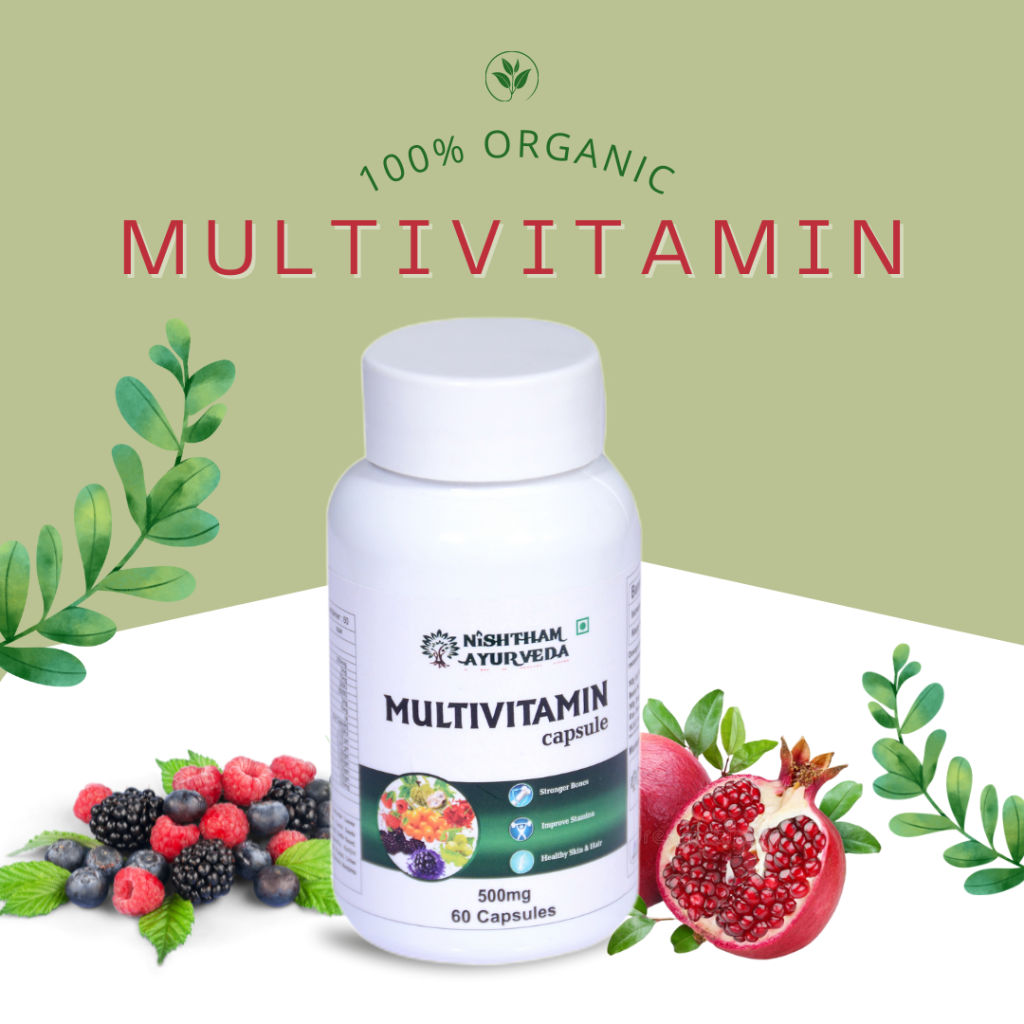Nutritional deficits have increased in recent years as a result of changing lifestyles. Daily dietary consumption does not provide all of the nutritional needs, which is why multivitamin demand has increased significantly in recent years. Multivitamins fill the nutritional void in our systems and are quick-acting, easily absorbed sources of nutrition.
Approximately two billion individuals worldwide are deficient in micronutrients, according to research done by the World Health Organization (WHO). The main components of these micronutrients are calcium, iron, and vitamins A, B, C, and D.
Extracts from plants and animals that are high in vitamins and minerals are used to make multivitamins. Maximum nourishment is obtained from them because they are in soluble form, which the body can easily absorb.
Observable characteristics of multivitamins
Vitamins and Minerals
Multivitamin supplements include the important vitamins and minerals needed for our bodies to perform at their best. These micronutrients are crucial for maintaining the body’s complex physical and mental processes.
Vitamins A, C, D, E, K, and eight B-complex vitamins should all be present in a healthy proportion in a multivitamin supplement. Thiamine, riboflavin, pantothenic acid, biotin, niacin, B6, B12, and folate are the vitamins that make up the B complex. The optimum dosage of these vitamins is required by the human body to function properly.
The supplement must additionally include essential minerals that work in conjunction with vitamins to support the body’s optimal operation. Iron, copper, zinc, phosphorus, calcium, magnesium, potassium, and iodine are some of the minerals that make up this group.
Daily Value (DV)
Every multivitamin bottle includes nutrients based on a 2000-calorie diet. Select a multivitamin that offers as close to the stated Daily Value for vitamins and minerals on the label as possible. It is crucial to keep in mind that we also consume vitamins and minerals from our food, so the consumption of the supplement should simply balance out what is lacking. For those who currently consume balanced diets, it’s crucial to be on the lookout for nutritional overload.
Specific Needs
- Every physical body differs from the others, and so do its needs. Multivitamins are now made with the specific requirements of males, women, children, and senior folks in mind. The best course of action is to purchase the most appropriate option in accordance with the following:
- Women’s Vitamins
- Women’s multivitamins are designed to make up for the essential nutrients they typically lose as a result of hormonal imbalances, childbirth, breastfeeding, menopause, and other conditions. Because women’s bodies undergo so many physical and hormonal changes throughout their lives, this is why it is so important to compensate for these losses.
- Since women’s bone density begins to decline in their twenties, calcium is a prominent component of women’s multivitamins. In addition to calcium, women’s supplements also have biotin, which strengthens weak, dry skin, hair, and nails.
- Prenatal vitamins, which contain folic acid, iron, calcium, vitamin D, DHA, and iodine, are given to women who want to become pregnant. These nutrients are in charge of encouraging the child’s healthy growth and development and also preventing birth abnormalities. Iron is advised for nursing mothers.
- Men’s Vitamins
- Men’s bodies also have unique needs that can’t really be fulfilled by nutrition. To create testosterone, support brain growth, and fortify bones, men require an adequate intake of vitamin D. To promote men’s prostate health, ideal vitamin E levels are also needed.
- Vitamins A, C, and E, as well as the minerals selenium and zinc, are necessary for maintaining good heart health. Magnesium is a key ingredient in the supplement that helps men, particularly those over 40, increase their energy levels. The majority of supplements are fortified with an active form of folate (Vitamin B), which promotes the function of red blood cells, and vitamin K, which inhibits blood clotting.
- Supplements for older adults
- As we age, our metabolisms decline, and older persons’ dietary needs change as a result. Their ability to absorb certain nutrients also declines, and their appetites are reduced. For older persons, a higher calcium and vitamin D consumption is advised as it promotes bone health and reduces injuries from falls.
- Older persons experience a decline in energy functions, and vitamin B12 is needed to increase energy levels in the body. Adults over 50 are advised to take a vitamin B12 supplement since they have trouble absorbing this ingredient from entire foods.
- A low-sodium diet and potassium supplements are recommended together to reduce blood pressure levels in the body.
- Vitamins for children’s
Due to their fussy eating habits, it is nearly impossible for parents to guarantee their kids get the recommended amount of nutrients from their daily diet. The proper ratio of vitamins and minerals are used in the production of children’s multivitamins to assist growth and development.
Vitamin A, which supports bone and tissue healing, is present in the majority of children’s supplements. Calcium and Vitamin D support bone health, supporting bone growth and development, and Vitamin C aids the body’s immune system.
The supplements could also be packed with Vitamin B12 extracts for optimum brain growth. Before adding multivitamins to your child’s diet, make sure they taste good and are simple to digest. Children’s gummy multivitamins are becoming more and more popular these days since kids love them, they taste fantastic, and they’re chewable and cute. To guarantee optimal nutritional intake, mothers find it convenient to swap out candy with these gummy multivitamins.
Opt for Organic Multivitamins
The human body is built to assimilate nutrient-dense, complete foods. Always think about purchasing multivitamins made from organic sources while making your selection. These multivitamins are formulated with premium-quality, chemical-free components that make them simple to digest. These supplements offer the body the most advantages because they are filled with components that are bioavailable. The body does not benefit as much from supplements created with artificial substances and chemicals.
When selecting multivitamins, look for certifications.
To ensure the product’s quality and safety, the regulatory authority must certify all supplement makers. The regulatory organizations evaluate the supplements’ quality based on a number of criteria, and they only give them their approval if they uphold high standards. One thing to look for when selecting a multivitamin is the accreditation and mark of the industry on the packaging.
Do You Need a Supplement?
While the majority of people do benefit from multivitamins, it is always advisable to determine whether you actually require them. It’s possible that you already eat a balanced diet and don’t need to take excessive amounts of vitamins. Additionally, there are several circumstances where multivitamin use should only begin at the doctor’s suggestion.
Some of these include –
- Women who are expecting or attempting to conceive – Prenatal vitamins for women who want to get pregnant include iron, folic acid, and vitamin D. However, because every pregnancy is unique, a doctor should be consulted before using any such supplement.
- Breastfeeding Mothers – Women who are nursing should be careful about the supplements they select, and only take them if their doctor advises them to do so because what they eat will directly affect their developing child.
- Vegan or Allergic to certain Foods – Being vegan or allergic to dairy makes it more difficult to obtain some nutrients. In order to determine which multivitamins can benefit your body in these conditions, it is always a good idea to speak with your doctor first.
- Senior Adults – Women and men over 50 should be especially cautious while selecting their supplements. Before beginning any supplements, the effects of hormonal shifts, lifestyle disorders, and physiological changes must be carefully considered.
- Had surgery in the past – Patients who have had gastric or bypass surgery may have trouble absorbing some nutrients due to their poor gut health. Therefore, it is advised to speak with a doctor before beginning a daily supplement.
- Have certain genetic health conditions – Your body may have trouble absorbing nutrients if you have:
- Inflammatory Bowel Disease
- Celiac Disease
- Cystic Fibrosis
- Liver Disease
- Cancer
- An Autoimmune Disorder
- Alcohol Dependence
- Hereditary Disorders
It is both impracticable and challenging to maintain track of the nutritional intake from our diets given our hectic lives and constant stress. Our daily nutritional needs can be met by taking multivitamins, which also help to improve our physical and mental health.
In addition to this, multivitamins assist mood enhancement and help the body produce more energy. However, using supplements alone is not sufficient. It is advised to lead a healthy lifestyle and eat a balanced diet to get the most advantages. The greatest method to maintain good health is to take vitamins in addition to leading a healthy lifestyle.


